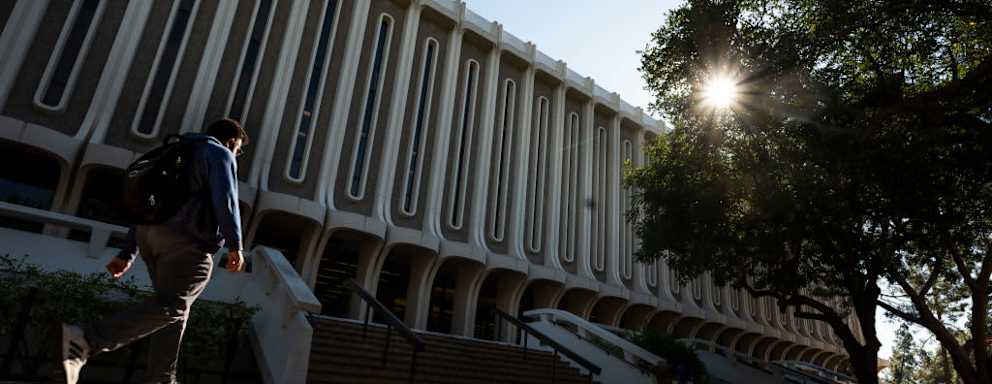As Colleges Adapt to Omicron, Most Resume In-Person Classes
 Credit: MediaNews Group/Orange County Register via Getty Images / Contributor / MediaNews Group / Getty Images
Credit: MediaNews Group/Orange County Register via Getty Images / Contributor / MediaNews Group / Getty Images- Only a small percentage of schools delayed their start to the 2022 spring semester.
- Remote learning in January is a more popular option, but it’s still rare.
- A larger percentage of colleges now require that students get a COVID-19 booster shot.
Prominent schools made headlines late last month when they announced plans to begin the 2022 spring semester online or delay the start of the semester entirely.
However, new data suggests these schools are outliers, not the norm.
Preliminary data from the College Crisis Initiative, an initiative from Davidson College that tracks school responses to crises including the COVID-19 pandemic, shows that only 1 in 10 colleges and universities plans to begin the year through remote learning.
Even less popular was the prospect of delaying the start of the semester, with less than 2% of schools surveyed reporting a delayed resumption of courses, according to the report.
The data included in this report is preliminary, but College Crisis Initiative Director Chris Marsicano said through Twitter that it includes approximately 75% of the sampling. He added that throughout the reporting process, the percentages have not fluctuated drastically.
— The College Crisis Initiative (C2i) (@C2Initiative) January 4, 2022Here is today's (1/4) update as we continue to collect campus responses to the #OmicronVariant. Data collection is not complete. These data should be considered provisional and subject to change. pic.twitter.com/nlBuB6FRQ1
Still, while the data is provisional and subject to change, it exemplifies just how reluctant colleges and universities are to make sweeping changes to campus life nearly two years into the COVID-19 pandemic.
Omicron cases are rising throughout the U.S., but the apparently less deadly nature of the strain and high vaccination rates at college campuses have caused many schools to treat the start of this semester similarly to those in 2021.
Not all mitigation measures were captured in this report, Crisis Initiative Assistant Director Rylie Martin told BestColleges.
For example, some institutions are giving staff and faculty the option to work remotely until students return to campus in an effort to avoid large gatherings. This strategy is not captured in the data, but it may help stem potential outbreaks.
Schools have largely avoided remote work and delayed starts, but many more institutions are updating their vaccine policies in recent weeks.
Over 1,000 schools already required a COVID-19 vaccine by the end of last year. Now more and more schools are requiring students to receive a booster shot for their vaccine at some point during the spring semester.
According to College Crisis Initiative data, 27.1% of schools now require a booster shot for students. Additionally, 24.7% require a booster shot for faculty and staff.
Martin added that the preliminary data shows interesting differences between how the types of institutions are implementing booster requirements. She said 45% of private schools the initiative has evaluated require boosters for students, whereas only 11% of public colleges and universities require it.
Many states forbid their public institutions from requiring vaccines, which explains some of the discrepancy, Martin said.
College Crisis Initiative’s report comes through scouting all U.S.-based NCAA Division 1 schools, Association of American Universities, and Annapolis Group institutions. As of Jan. 4, the initiative had collected data on 388 of the 504 schools that make up its intended sample.
Some institutions flirted with the idea of a delayed or remote start to the year, but they ultimately decided against it.
Pennsylvania State University told students in mid-December that it was monitoring the omicron surge and the school was “prepared to alter return plans for the semester if deemed necessary.” Two weeks later, the Penn State President Eric Barron alerted students that plans would not change.
“Our students, faculty and staff have a very high vaccination rate, we are testing weekly those who are not vaccinated and we are continuing to require face masks to be worn indoors,” Barron said in a statement. “With these measures in place, together with hospitalization data and what we are learning about omicron, we believe we can safely, but carefully, return to on-campus classes and activities as planned.”
Prominent schools including Harvard University, Duke University, Stanford University, and Howard University have all opted for a combination of remote learning and/or a delayed start to classes in January.
Additionally, dozens of schools and university systems have instituted booster mandates across the U.S. The Centers for Disease Control and Prevention recommends that everyone 12 and older get a booster when eligible.